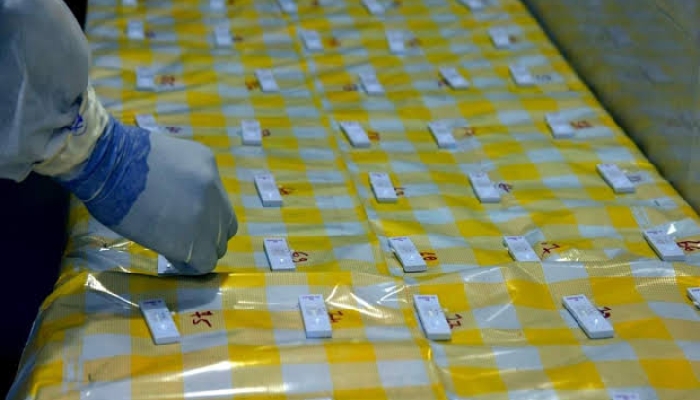Mangaluru, Jan 24: Haji Abdul Hameed Kandak, a well-known social worker, veteran community leader and philanthropist of Mangaluru, passed away on Wednesday evening after he suffered a massive cardiac arrest while delivering a speech.
72-year-old Haji is survived by his wife, four sons, a daughter, and a large number of relatives, friends and well-wishers.
He collapsed on the stage while speaking as a chief guest at a seminar on judiciary and constitution organised by the Dakshina Kannada district unit of Ahinda movement at Woodlands Hotel in the city on the eve of Republic Day.
He began his speech expressing frustration over the current situation in India. “Those who are trying to change the constitution and those who killed the father of the nation are ruling our country now,” he said.
He also said that even though religious minorities, backward classes and dalits together comprise a vast majority of India’s population, they are oppressed and suppressed by a very small section of people. “We had built Ahinda movement years ago. However there is no unity among us. We are divided and deprived of all our rights. A small section of people is ruling us,” he said and called upon Ahinda communities (minorities, backward classes and dalits) to unite.
Meanwhile, the speaker’s face turned pale. He almost lost his voice when he said that he was feeling uneasy. All of a sudden he collapsed. DYFI leader Muneer Katipalla, fishermen community leader Vasudeva Boloor, former Beary Academy president B A Mohammed Haneef and others who were present on the stage rushed to help him. Within minutes Haji was taken to nearby Unity Hospital where he breathed his last.
Mr Katipalla said that Haji was active till last moment and prior to the commencement of Ahinda programme he mingled with the people freely and discussed about the social and political situation of the coastal Karnataka.
Son of a farmer, Haji Abdul Hameed Kandak was a successful businessman in the city. He had engaged in travel industry. He was an advocate of unity among Muslims. He had been at forefront of several social movements and was a prominent Muslim leader in coastal Karnataka. He had served as member of the All-India Haj Committee, and as vice-president of the Dakshina Kannada and Udupi Muslim Central Committee. He had also been the president of Central Market Merchants' Association. He was also a leader of Congress party.
Family sources, said that the last rites will be performed at Ullal Darga mosque premises on the outskirts of the city on Thursday, January 25.
Political, religious and social leaders including Dakhsina Kannada district in-charge minister B Ramanath Rai, Food minister UT Khader, DK and Udupi Muslim Central Committee president Haji K S Mohammed Masood among others have expressed deep condolences on the sad demise of Haji Hameed Kandak. Various organizations and parties including Congress, PFI, SDPI, Jamaat-e-Islami Hind, Indian Social Forum etc too have shared condolence messages.






Comments
Such a wonderful man he was... heartfelt condelonce from us..
MAY ALLAH GRANT HIM JANNATUL FIRDOUSE -AAMEEN. HE WAS GOOD LEADER AMONG ALL.
Innaa Lillaahi wa inna ilaihi raajihoon. Allaahummghfirlahoo warhamhoo waghfirlahoo yaa Rabbal Aalameen. ameen. May Almighty Allah give him the right place in Jannathul Firdouse ameen. We pray Almighty ALLAH to give patience to the family members to bear the irreparable Loss.
Inna lillahi wa inna ilaihi raajioun. We pray with almighty allah to bless late haji abdul hameed kandak with his jannaathul firdouse, aameen. May almighty allah give patience & forebearance to his family to bear the brunt of bereavement. This humble gentleman is known to me since last 50years or more during his association as a manager in a bombay based company called byculla transport co, near badria masjid, bunder, mangalore. Due to his sincere & social nature as a mediater & compromiser between two parties or groups and to unite them., he was familiarly and friendly addressed by his friends circle as uno chief. Holy qur'an says *kullu nafsin zaikathul mouth* (every living soul has to taste death). Even though his death is a great loss to the community and humanity, we have to respect our creater almighty allah's decision & pray for his maghfirah.
IInna Lillahi Va inna ilahi rajivoon, May Allah grant him Jannat. Whenever we met always discussed about community issues. His deep concern about disunity in the community, enmity among brotherly communities and leader’s failure to tackle on burning social and community issues are highly praise worthy.
Haji H Kandak was very genious and concenred about Muslim community, He was an inspiration for me to get into socio political field in 90s when I was an LLB student. Really a bing loss for the muslim community in particular and society in general. May allah give him maghfirath and paradise
Innalillahi wa inna iaihi rajivoon. Unbelievable. I recently spoke to him. Recent developments in coastal Karnataka had saddened him. May allah reward him jannah.
Shocking incident. Really unbearable loss for the Muslim community in Manglaore. May he rest in peace
He was an honest man. He was not just a mulsim leader. He treated all communities equally.
Inna lillahi va inna ilahi rajivoon. Subhanallah he was active till last moment of his life. May allah grant him jannah
إِنَّا لِلّهِ وَإِنَّـا إِلَيْهِ رَاجِعونَ) "We belong to Allah and to Him we shall return"
Community lost a great leader who was striving for the unity.
May Allah grant him Jannathul Firdouse
Add new comment